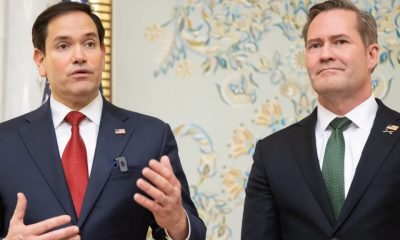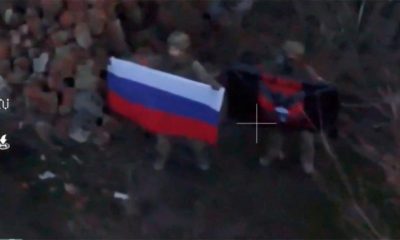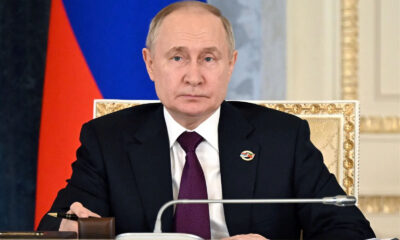International
Russia hits Kyiv missile factory after flagship sunk

Russia pounded a Ukrainian rocket factory following the sinking of its Black Sea flagship, as President Volodymyr Zelensky said his allies could shorten the war by delivering the weapons he had requested.
The Vizar factory, near Kyiv’s international airport, was seriously damaged in the overnight strikes, an AFP journalist saw on Friday.
Russia said it had used sea-based long-range missiles to hit the plant, which Ukraine’s state weapons manufacturer says produced Neptune cruise missiles — the projectiles both Kyiv and Washington say were used to sink the Moskva warship.
“There were five hits. My employee was in the office and got thrown off his feet by the blast,” Andrei Sizov, the 47-year-old owner of a nearby wood workshop, told AFP.
“They are making us pay for destroying the Moskva,” he said.
A Pentagon official briefing reporters said the ship had been hit with two Neptunes — contradicting Russia’s claim that the ship lost balance in rough seas as it was towed to port after ammunition exploded.
The Moskva had been leading Russia’s naval effort in the seven-week conflict, and the fate of its crew of more than 500 was uncertain.
The Pentagon official said survivors were observed being recovered by other Russian vessels, but Ukrainian authorities said bad weather had made rescue operations impossible.
READ ALSO:
- FG moves for abducted train passengers release, opens talks with abductors
- Policeman shot dead in Soludo’s community, Anambra
- Nigeria limping towards disaster, says Emeka Anyaoku
The Russian fleet in the Black Sea has been blockading the besieged port city of Mariupol, where Russian officials say they are in full control although Ukrainian fighters are still holed up in the city’s fortress-like steelworks.
– Weapons plea –
In his nightly address, Zelensky made another plea for allies to send more firepower to boost the defence efforts.
“You can make the war much shorter,” he said. “The more and the sooner we get all the weapons we have requested, the stronger our position will be and the sooner peace will come.”
The head of Ukraine’s army had made a similar point in a phone call to the chairman of the US Joint Chiefs of Staff Mark Milley, the military said on Saturday.
The United States has already pledged a new $800-million military aid package for Ukraine this week, including helicopters, howitzers and armoured personnel carriers, and on Friday the German government said it plans to release more than a billion euros ($1.1 billion) in aid as well.
US media reported that Russia had sent a formal complaint to Washington about its support of Kyiv this week.
In the diplomatic note, Moscow warned the United States and NATO against sending the “most sensitive” weapons, saying such shipments were “adding fuel” to the situation and could come with “unpredictable consequences”, the Washington Post reported.
Zelensky warned Friday that Russia might use nuclear weapons out of desperation as its invasion falters, echoing recent comments by CIA director William Burns.
“They could do it, I mean they can,” Zelensky told CNN. “For them, life of the people is nothing.”
– ‘Wait for quieter times’ –
The attack on the Vizar factory was the first major Russian strike around the Ukrainian capital in more than two weeks.
Russian forces last month started withdrawing from around Kyiv as they were redeployed to focus on the east of the country, but the city remains vulnerable to missiles.
Kyiv regional governor Oleksandr Pavliuk said there were at least two other Russian strikes on the city Friday, adding civilians thinking about returning should “wait for quieter times.”
The Russian defence ministry has in fact warned it will target Kyiv “in response to any terrorist attacks or sabotage committed by the Kyiv nationalist regime on Russian territory”.
For now, Russia’s military focus seems set on seizing the eastern Donbas region, where Russian-backed separatists control the Donetsk and Lugansk areas.
This would allow Moscow to create a southern corridor to the occupied Crimean peninsula, and Ukrainian authorities have been urging people in the region to quickly move west in advance of a large-scale Russian offensive.
The UN’s World Food Programme has appealed for access to those who cannot get out.
READ ALSO:
- As rising food prices take toll on Nigerians, inflation hits 15.92%
- Four Kidnapped students of Zamfara Health College regain freedom
- Train passengers to present NIN before boarding from May – NRC
“It’s one thing when people are suffering from the devastation of war. It’s another thing when they’re being starved to death,” WFP director David Beasley said in a statement.
– Shelling in Kharkiv –
Ahead of the anticipated Russian push, towns and cities in the east been subjected to what residents say is incessant shelling.
On Friday AFP witnessed the aftermath of several strikes in the industrial district of Kharkiv, where authorities said 10 people were killed and 35 injured.
The charred remains of three rockets were visible, and around a dozen football-sized craters were spotted across the area AFP saw in a short visit.
One 38-year-old man was killed when shrapnel burst into his apartment as he smoked by the window.
“Everything started, the glass fell down and I saw him lying in a pool of blood,” his mother said. “I told him before that we should leave. He said we should stay.”
For its part, Russia on Friday claimed Ukraine was preparing a missile strike on its own refugees at a railway station in the Kharkiv region, in the town of Lozova.
The allegations echoed Russia’s widely dismissed claim that Kyiv was responsible for a missile strike on April 18 that killed scores at another railway station.
Moscow has been accused of widespread war crimes by Ukraine and its allies, and international experts have already arrived in the country to begin investigations.
A team of French experts has been working for several days in the town of Bucha, which has become synonymous with alleged Russian atrocities.
Local authorities say hundreds were killed there, and on Friday the region’s police chief said 95 percent died from gunshot wounds.
– Financial support –
As well as military aid, Zelensky appealed for financial support in his address late Friday.
“The sooner the democratic world recognises that the oil embargo against Russia and the complete blockade of its banking sector are necessary steps towards peace, the sooner the war will end,” he said.
Last week European countries announced expanded efforts to wean themselves off Russian gas, and Germany on Friday released nearly three billion euros ($3.2 billion) to acquire floating liquefied natural gas import terminals.
But Berlin does not consider it realistic to be able to do without Russian gas before mid-2024.
The war in Ukraine has also had a profound effect on European countries’ security considerations, with Finland and Sweden considering joining NATO.
Moscow, which invaded Ukraine partly because of deepening ties between Kyiv and NATO, on Friday warned of consequences should they join the US-led defence alliance.
“They will automatically find themselves on the NATO frontline,” Russian foreign ministry spokeswoman Maria Zakharova said.
Shortly afterwards, Finland’s European Affairs Minister Tytti Tuppurainen said it was “highly likely” that her country would apply for NATO membership.
Unlike Sweden, Finland neighbours Russia, from which it declared independence in 1917 after 150 years of Russian rule.
AFP
International
AI will replace doctors, teachers, others in 10 years – Bill Gates
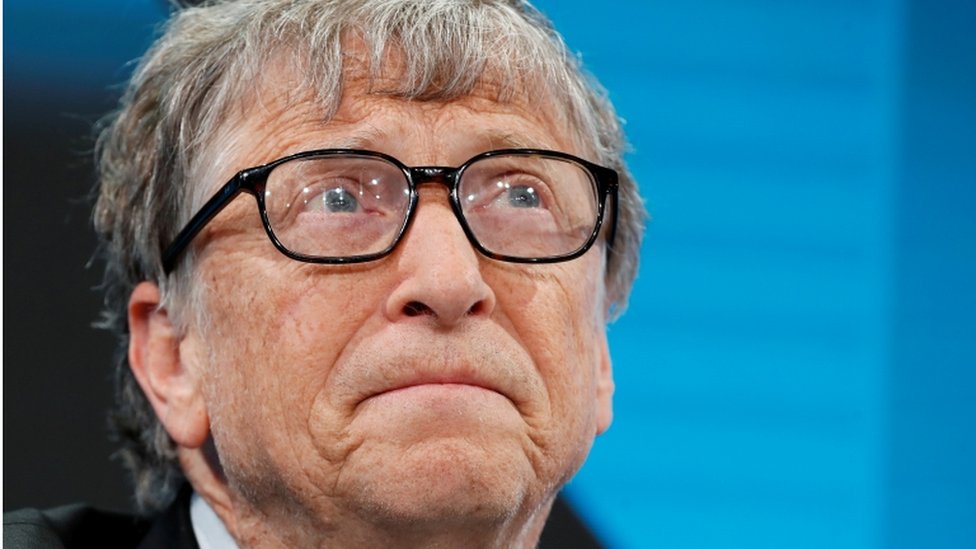
AI will replace doctors, teachers, others in 10 years – Bill Gates
Bill Gates, a co-founder of Microsoft, has claimed that improvements in artificial intelligence (AI) over the next decade may render humans superfluous for the majority of work.
In a recent interview with comedian Jimmy Fallon on NBC’s The Tonight Show in February, the billionaire philanthropist discussed how AI may take over many facets of life and business.
Gates remarked that expertise is currently “rare”, emphasising the continuous reliance on human specialists in industries such as medicine and education.
For example, we continue to rely on highly trained individuals, such as “a great doctor” or “a great teacher”, whose knowledge cannot be simply replaced by AI.
However, “with AI, over the next decade, that will become free, commonplace — great medical advice, great tutoring,” Gates said.
READ ALSO:
- Senate seeks FG’s immediate intervention to slash data prices
- Reno Omokri: Nigeria gives more opportunities than US, Britain, Canada
- Driver remanded for causing Osun varsity students’ death
In other words, Gates believes that the world is entering a new era of “free intelligence”, as he described in a recent interview with Harvard University professor and happiness specialist Arthur Brooks.
According to Gates, this transition will result in rapid breakthroughs in AI-powered technology, making them more accessible and affecting almost every part of our lives.
These breakthroughs will vary from more effective treatments and diagnoses to widely available AI instructors and virtual assistants.
“It’s very profound and even a little bit scary — because it’s happening very quickly, and there is no upper bound,” Gates told Brooks.
The discussion of how humans will fit into an AI-powered future continues.
Some analysts suggest that artificial intelligence will improve human productivity rather than completely replacing labour, hence driving economic growth and creating new jobs.
However, Microsoft AI CEO Mustafa Suleyman cautions that technological improvements in the coming years will disrupt the nature of most occupations across nearly all industries, potentially exerting a “hugely destabilising” influence on the workforce.
AI will replace doctors, teachers, others in 10 years – Bill Gates
International
Poland suspends migrants’ right to apply for asylum
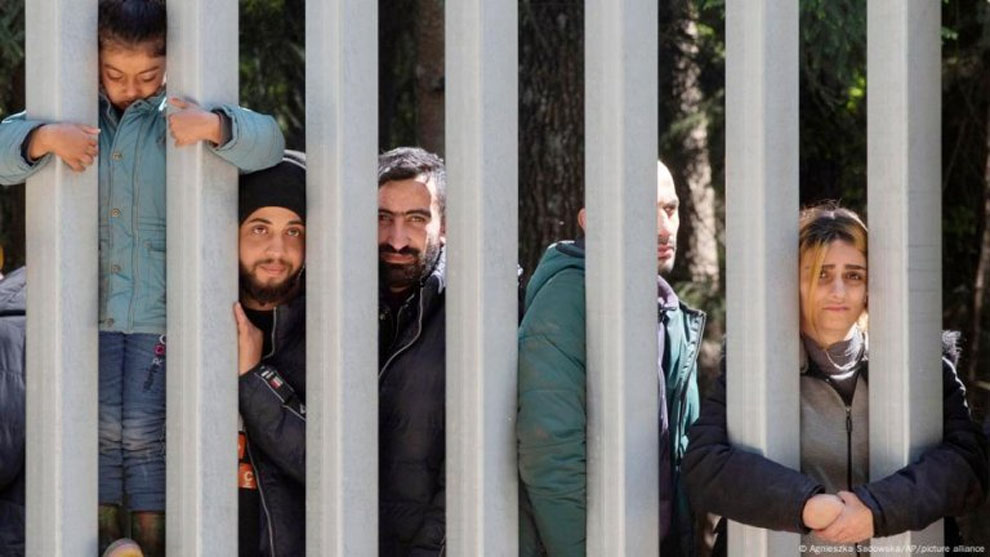
Poland suspends migrants’ right to apply for asylum
Poland has temporarily suspended the right of migrants arriving in Poland via its border with Belarus to apply for asylum.
Prime Minister Donald Tusk announced it would be happening after the controversial bill, which will allow Polish authorities to suspend this right for up to 60 days at a time, was signed into law by President Andrzej Duda.
Tusk had said it would be adopted “without a moment’s delay” while Duda said the changes were needed to strengthen security on the country’s borders.
But the law has been criticized by rights groups including Human Rights Watch, which said the EU should take legal action against Poland if it was implemented.
The group urged the country’s parliament last month to reject the bill, saying it “flies in the face of Poland’s international and EU obligations” and could “effectively completely seal off the Poland-Belarus border, where Polish authorities already engage in unlawful and abusive pushbacks”.
READ ALSO:
- Trump slaps 25% tariffs on car imports to US
- Reps pass bill to strip Vice President, governors, deputies of immunity
- Businessman collapses in court during trial over $578,000 cash seizure
The government said previously the suspension would only be applied temporarily to people who pose a threat to state security, for example large groups of aggressive migrants trying to storm the border.
Exemptions will be made for unaccompanied minors, pregnant women, the elderly or unwell, anyone exposed to “real risk of serious harm” by being returned and citizens of countries accused of conducting the instrumentalization of migration – like Belarus
Tusk has dismissed criticism from human rights groups.
“Nobody is talking about violating human rights, the right to asylum, we are talking about not granting applications to people who illegally cross the border in groups organised by Lukashenko,” he said in October.
Since 2021, Poland, Lithuania, Latvia and Finland have seen a huge increase in the number of people crossing into their countries illegally from Belarus and Russia.
Polish authorities have sent thousands of troops and border guards to police its border with Belarus and built a 5.5-metre-high steel fence along 186 km of the frontier where at times several thousand migrants have been left stranded.
Rights groups estimate more than one hundred people have died on the borders between Belarus and Poland, Lithuania and Latvia since 2021.
EU eastern flank countries and the European Commission have accused the Belarusian and Russian authorities of weaponising migration to create a new route into the EU to destabilize the bloc.
Poland suspends migrants’ right to apply for asylum
BBC
International
Trump slaps 25% tariffs on car imports to US

Trump slaps 25% tariffs on car imports to US
US President Donald Trump has slapped new 25% import duties on autos and car parts entering the US, threatening to escalate the global trade war.
Trump said the additional duties would go into effect on April 2, with levies on businesses importing autos beginning the next day. Charges for parts are scheduled to begin in May or later.
The president stated that the proposal would result in “tremendous growth” for the auto industry, saying that it would boost jobs and investment in the United States.
However, analysts believe the measure will result in a temporary stoppage of significant US vehicle production, higher costs, and strained relations with allies.
Last year, the US imported approximately eight million cars, accounting for approximately $240 billion (£186 billion) in trade and roughly half of total sales.
Mexico is the top foreign supplier of cars to the US, followed by South Korea, Japan, Canada, and Germany.
Trump’s latest move could disrupt global car trade and supply chains. Many US car companies have operations in Mexico and Canada under the terms of the long-standing free trade agreement.
READ ALSO:
- Reps pass bill to strip Vice President, governors, deputies of immunity
- Businessman collapses in court during trial over $578,000 cash seizure
- Fire guts Onitsha market, many shops, goods destroyed
However, the new taxes on parts from Canada and Mexico are exempt until US Customs and Border Patrol establish a method to assess the duties, according to the White House. Every day, billions of dollars in goods cross borders between neighbouring countries.
On Wednesday, General Motors’ stock fell almost 3%. The sell-off spread to other firms, including Ford, following the president’s speech that reaffirmed the tariffs.
When asked during a news conference if there was any chance he would change his mind, Trump responded no, later adding, “This is permanent.”
“If you build your car in the United States there is no tariff,” he said.
Japanese Prime Minister Shigeru Ishiba stated that his government would consider all measures in reaction to the taxes.
Japan, home to several major automakers, is the world’s second-largest vehicle exporter.
Japanese automakers’ shares, including Toyota, Nissan, and Honda, sank in early trading in Tokyo.
A tariff is a levy on imports levied by the government and paid by the company importing the goods.
Trump has welcomed the instrument, intending to use it to target a wide range of imported goods as part of a larger effort to defend American industries and increase production.
However, while the rules can protect domestic industries, they also increase costs for businesses that rely on imported parts, such as carmakers.
According to the Anderson Economic Group, 25% tariffs on parts from Mexico and Canada alone could increase the cost of a car by $4,000 to $10,000, depending on the type.
Trump slaps 25% tariffs on car imports to US
-

 metro2 days ago
metro2 days agoAttack on Mufty of Ilorin: Onikijipa Family Charges Stakeholders to Call Sheikh Habibullahi Al-Ilory to Order
-

 Health2 days ago
Health2 days agoNigerian doctor pioneers W’Africa first robotic prostate cancer surgery
-

 metro2 days ago
metro2 days agoFubara: Supreme Court reacts to photo of Justice Agim with Wike
-

 metro2 days ago
metro2 days agoUNIOSUN mourns as 5 students die in auto crash
-

 metro1 day ago
metro1 day agoHow ritualists, native doctor drugged, murdered underage sisters in PH – Police
-

 International1 day ago
International1 day agoCanada removes bonus ranking points for job offers in Express Entry system
-

 metro6 hours ago
metro6 hours agoJUST-IN: Ex-Oyo gov Ajimobi’s first child Bisola dies At 42
-

 metro2 days ago
metro2 days agoAgain Obasanjo accuses federal lawmakers of bribery



